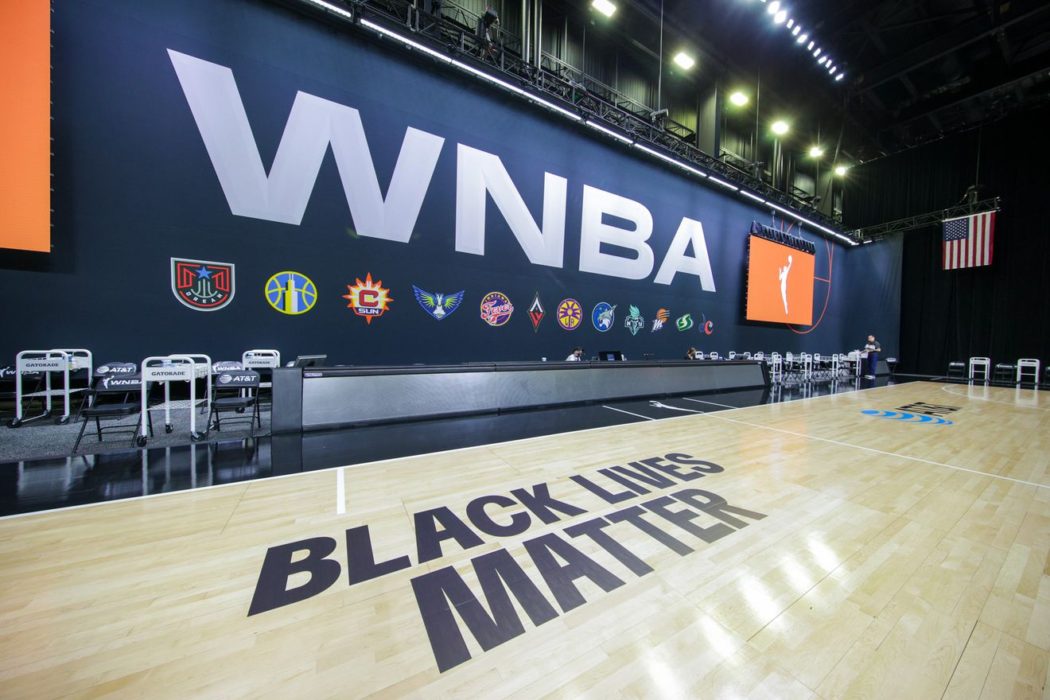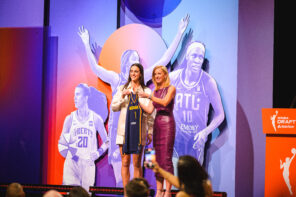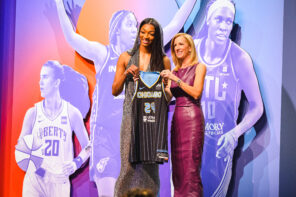Apparently, certain individuals did not get the memo from last year that taking care of one’s mental is as vital as taking care of the body.
This past week, much of the sports conversation has revolved around 23-year old tennis superstar Naomi Osaka (Japan) as she was preparing to compete in this year’s French Open at Roland Garros in Paris.
Osaka took to Twitter one day prior to the start of the competition and announced that she would be putting her full focus on competing in the Grand Slam tournament, meaning she would not do any post-match interviews while at the tournament.
— NaomiOsaka大坂なおみ (@naomiosaka) May 26, 2021
Note the reason she gave for her refusal to do pressers – mental health, ironically during May which is Mental Health Awareness Month. Mental health is something we as a society used to place an unfair stigma around because we allowed men to control the narrative on how the topic is approached. Note: many of these same men who consider it to be “soft” to express emotions are the same men who will do the very same in private, but not in public.
One would think that after the ordeal the entire planet has had to go through thanks to the parameters of the coronavirus pandemic that men who run sports organizations would do much better in respecting a person’s wishes in not wanting to do press.
Apparently not.
Osaka stayed firm on her commitment to not be available to the media after one of her recent matches – and was assessed a $15,000 fine by the bean counters at Roland Garros for it. Not only that, there is now a threat to default her from the tournament. The four Grand Slam tournaments – the French Open, Australian Open, US Open and Wimbledon – are displaying their collective tone-deafness by threatening further consequences as far as post-match press conferences are concerned.
This sounds like something very much the sport of tennis would do. The same sport of tennis that constantly tries to bend the rules against Serena Williams for either showing emotion on the court or for what she chooses to wear during matches but celebrates it when a man like John McEnroe gets testy at line judges for calls he did not like.
The same sport of tennis that apparently has no problem ticking off one of its young stars at a time where the women’s game is the heartbeat of the sport. The Grand Slams want to oust Osaka from future tournaments if she refuses to honor press obligations? Something tells us the television networks from around the world would have something to say to these Grand Slam dinosaurs about that because tennis has very few draws outside of anyone with the last name of Williams, Osaka or Coco Gauff.
Does this sound like a sport that badly yearned for Anna Kournikova to be a thing or what?
Does this sound like a sport still hurt over Maria Sharapova never being as big as the Williams sisters or what?
If Osaka is uncomfortable with the idea of doing post-match pressers, that is her wish and it should be respected as such. Her non-media detractors are having the gall to compare it to a “real job” when all that shows is nothing but insecurity and jealousy. Also, we are guessing they would not be too comfortable with the idea of being hounded by press after a long day’s work as a coffee-maker at the mechanic’s place where their friend’s daddy is the only reason they have a job.
Also – the media detractors apparently have been in their profession for too much and have a clear sense of entitlement as if it is their right to have access to players. In a climate where there is more media than ever nowadays, everyone is a journalist because of cell phones and fake journalists simply want to use athletes and celebrities for clout, athletes such as Osaka are justified in wanting to protect their mental health in preparation for an important event such as the French Open.
Again – one would think after the year and change we went through that we would be more cognizant than ever of mental health issues. Apparently that is not the case in Paris – or in Melbourne, or New York or in London. Perhaps the dinosaurs who run the Grand Slam tournaments need to ask WNBA players about how important it is to take care of oneself both physically and mentally.
Perhaps the dinosaurs who run the Grand Slam tournaments need to ask WNBA players about how taxing it was last year to play an entire season in an enclosed bubble in Florida while having to think about being dehumanized by one of its (now ex-) owners as well as the George Floyd and Breonna Taylor murder cases. Perhaps the dinosaurs who run the Grand Slam tournaments need to watch the Chiney Ogwumike-produced ESPN Films “144” about how mentally draining it was for WNBA players to play the 22-game season in the enclosed space that was the IMG Academy Wubble in Florida.
Perhaps the dinosaurs who run these Grand Slam tournaments should have received notice of how many WNBA players at this year’s media days – including the Los Angeles Sparks’ Nneka Ogwumike – were asked about self-care. These were unarguably the best questions that were asked at these media days especially after what WNBA players went through last year.
The larger question that needs to be asked is why – and that’s what otherwise well-meaning journalists need to be asking when an athlete like Osaka announces something as this.
Could it be because she is a Black and Asian athlete that feels uncomfortable with the idea of being asked critical questions mostly by white male journalists, many of whom yearn for the days of McEnroe and are probably more interested in male tennis players such as Andy Roddick, Roger Federer and Novak Djokovic anyway?
Could it be because she understands that some media at these pressers (for all sports) asks questions that are not meant to provoke thought, but are only done with the idea of fishing for a headline-grabbing quote that will make news?
Could it be because she wants the press to realize that she is a human first and a tennis player second? That tennis is simply something that she does and not something that she allows to define her.
The correct answer is, of course, all of the above.
Athletes are human when all is said and done. Yes, we may become enthralled with their superior skills at sport and their talents are without question a gift that we as fans and media are privileged to witness. But what is Naomi Osaka without a tennis racquet in her hand?
A human being who goes through real human trials and tribulations. She is simply a bit richer than a lot of us.
What are Nneka Ogwumike, A’ja Wilson or Candace Parker when they are not donning a Sparks, Las Vegas Aces or Chicago Sky jersey?
All are human being when all are said and done and all go through their own respective trials and tribulations when the bright lights of the WNBA are not shining on them.
What is Sabrina Ionescu when she is in street clothes instead of a New York Liberty jersey or starring in commercials for BodyArmor or State Farm? She is still Sabrina Ionescu, a human being with her own life and trials and tribulations like the rest of us. Why do we bring up Ionescu? She once remarked to Insider that she developed a friendship with Osaka while on the set of the shoot for the ad.
The rise of social media coupled with athletes letting their voices be known on a field that really matters – the streets to rally and protest for social justice – has given sports fans a different lens to see athletes. For such a long time, media has created this narrative and culture that athletes have no life outside of the sport they play. As a result, fans have dumbly fed into this narrative.
Many fans ignorantly believe that since the only glimpse of an athlete is what they see on the court, field, ice or pitch that it should be the thing that defines their lives. Today’s athlete understands that sports are a business – like the businesses these same fans work at in their daily lives. They are showing us that while they play sports, they do not allow their lives to be defined by sports.
It is our job as sports fans and sports media to adapt to that. Thankfully, many of us have. In fact, looking at an athlete through a human lens as opposed to a sports lens actually makes sports better because it allows for the fan to envision Naomi Osaka the human being. And A’ja Wilson the human being. And LeBron James the human being.
And Colin Kaepernick the human being.
Actually, it helps for media coverage because today’s sports fan wants this sort of content. What are the fashion tastes of a Naomi Osaka? What are the musical preferences of an A’ja Wilson? What are the favorite foods of a LeBron James (other than Taco Tuesday of course)? What are the pet peeves of a Simone Biles? Take away the money, fame and athletic ability and we find out that lots of athletes are just like us.
Our WNBA family should know that many players – such as Wilson and her Aces teammate Liz Cambage have been very open with us in the past about their struggles over the years with mental health. Both Wilson and Cambage even wrote pieces in The Players’ Tribune opening up about the topic.
Unfortunately, there are plenty of otherwise well-meaning individuals who work at heritage media companies who have fed into this narrative of only framing athletes through an athletic lens – hence lots of the negative backlash to Osaka’s decision. They need to ask themselves why that is?
Are they so obsessed with clicks, Google searches and views that they feel nothing else matters except the numbers? Have they become so neck-deep into their profession that they have become dehumanized themselves by their profession and only view those that they cover as emotionless machine who are only allowed to eat, sleep, drink and breathe their sport?
Then some tough love needs to be administered to those journalists who have this caveman way of thinking.
Those journalists who have that mindset need to exit the profession yesterday and make way for younger, hungrier, culturally hip journalists that 1) actually do look at athletes as human beings because of the more intense mental health pressures younger scribes have endured and 2) understand that that mindset to covering sports in 2021 is outdated and is the basis for an icy relationship between you and said athletes (one where you will get no headline-making quotes because what athlete wants to talk to someone that does not respect you and 3) actually love the sports they cover.
Oh, and another thing that may help? More diversity in newsrooms. We are guessing that had as much to do with Osaka’s decision as anything.
We are not saying athletes should be above criticism – and most athletes that are covered likely would not say that either. If an athlete does something critical (or inhumane in the case of the Atlanta Braves’ Marcell Ozuna) that athlete deserves the fair amount of criticism. We are saying that in today’s sports culture, Osaka’s decision is getting more praise than it would have in the 1980s or 1990s. Sports culture, especially among today’s youth, understands that the criticism we have lauded at athletes for simply being human should be more reserved for those in front offices making financial decisions regarding teams, arenas and media deals.
One more thing about the media. We are so quick to assign criticism wherever we see fit. Heck, some people simply get into media because they believe it gives them a near-license to criticize what they could not on a regular basis.
The media itself cannot be above criticism. And anyone who believes otherwise is also someone who should exit the profession yesterday and (at the very least) take some time away from it if not entirely depart for a new career. How does an athlete that is at the top of the class in her sport get more criticism for protecting her own mental than an NFL coach who literally bestowed a roster spot to someone who had been out of the league for nine years for simply nepotistic reasons?
Because we are afraid if we criticize that coach that we are afraid of losing access to said coach and said team? Weak.
Sometimes, we need to be held accountable by athletes as to if we are doing our jobs correctly. And we need to look at ourselves in the mirror and tell ourselves if we are doing the best we can at our jobs. Because what Osaka did in deciding not to talk to the media was something that was done by Osaka the human being, not Osaka the tennis player.
Osaka in deciding to not talk to the media out of the sake of her own mental health was a message to the press that she will not simply be placed in the athlete box that sports journalists (and fans, for that matter), have tried to place athletes – particularly Black athletes – in for eons. Why are some in media having the nerve to rip her for this – as if they or their family and friends have not gone through their own bouts with mental illness?
Press conferences are not going anywhere anytime soon. And there will always be a good number of athletes that actually relish doing press. We remember during New York Liberty media day on May 10 that prior to DiDi Richards’ media availability, it was mentioned that she actually liked talking to the media. We at Beyond the W even got to ask her about she wanted Lib Loyals to know about her as she introduced herself to her new city.
From Liberty media day:
Joyner Holmes on if she feels something was missing from last year’s 2-20 NY team
DiDi Richards on what she wants Lib fans to know about her on and off the court@BeyondTheW @LoIra_BTW @iamlamarcarter #WNBA #CountIt #OwnTheCrown pic.twitter.com/xktra3yePO
— 𝗔𝗸𝗶𝗲𝗺 𝗕. 𝗕𝗮𝗶𝗹𝘂𝗺 👨🏾💻🎙🖥🎥📰📺 (@AkiemBailum) May 12, 2021
But one thing about pressers is they are a relatively mundane part of the sports process. Looking at athletes as human beings they are with real emotions will only further humanize sports coverage.
Imagine a star player participating in her, their or his first championship event with a big lead or advantage late. Mentally, that player is probably thinking that they are on the cusp of a crowning achievement in their career and all the hard work, blood, sweat and tears are finally about to pay off.
Then, a series of unforced errors befell that player or that team and that player or team is unceremoniously halted in its quest to achieve the ultimate success that they probably have been dreaming about since they were little kids watching sports with their parents on television.
One could say Aliyah Boston of the South Carolina Gamecocks had a moment like that in this past year’s NCAA tournament. Of course, she is not letting that one miscue in the closing seconds of her Final Four contest against Stanford define her career. She knows her time is coming.
But one could understand if she were to do have done a press conference at the time and was visibly upset. Being in the heat of battle for such a long season – especially one such as 2020-21 through the problems with COVID and coming so close to sending your team to a championship game only for the ball to not bounce your way at the end? Imagine if that press scenario played out.
Media needs to do a better job of understanding the emotions of athletes – particularly those of Black, Brown and Asian athletes. If felt uncomfortable with talking to the media after that game, the response should not be to call her a “soft” athlete (as if “soft” and emotional is a bad thing). The response should be to look at Boston as a human and understand her emotions in that moment. Because if any of us were in that same scenario, we would likely react in the same way.
Instead of believing that athletes should automatically turn off an emotional switch the nanosecond they step off the field of play, look at those athletes as human being (like us) whose emotional switches should always be on. Because for the athlete, sports is merely an element of their overall lives – those that are filled with ups and downs.
On plenty of occasions when media receives injury reports, they only detail physical injuries. Whether it was the sternum fracture that has sidelined Diana Taurasi (Phoenix Mercury) for 4-6 weeks, the MCL injury that has sidelined Natasha Howard (Liberty) for 4-6 weeks, or the back problems Amanda Zahui B. (Sparks) was having, mostly only physical injuries are detailed in those reports. We almost never see a player having been listed as having “mental health reasons” for why she, they or he decides not to play and lots of times these are dressed up as “personal reasons” or “load management.”
Instead of using this as an opportunity to further pile on Osaka for protecting her own mental health, we should use this as a teachable moment with many important lessons.
Firstly – we are more than our jobs. We cannot take our careers with us when our time comes.
Second – self-awareness does not mean we are failed individuals. It means we are trying to get better every day while understanding that we will never achieve true perfection. After all, we are all humans and are all flawed in our own ways, even if we have secured the bag to the extent of a Naomi Osaka.
Third – and this could be the most important. Osaka is shifting the conversation rightly from athlete performance to mental health. Let us all do better at monitoring our own mentals and simply doing what we can to ensure the loved ones in our lives are ok.
It is ok to not be ok. And slowly, but surely, we are ending the stigma.
Let’s change the narrative on this special day where we create an agenda for Black women that demands safety, rest, a seat at the table, and more rest.@Andreabrowng #BlackMindsMatter #MothersDay #BlackWomen#MentalHealthAwarenessMonth #BlackGirlMagic pic.twitter.com/oyr37GFE5x
— Black Mental Health Alliance (@BlkMentalHealth) May 9, 2021
Here are some online resources to stay more informed about AAPI Mental health and how to support our communities. #StopAsianHate
1⃣ https://t.co/8mqtiCVhRu
2⃣ https://t.co/WatB4FDZmd
3⃣ https://t.co/UteBlaP7O5 pic.twitter.com/GLhYl8C9JL— Dignitas (@dignitas) May 28, 2021
Our Affiliates continue to improve the lives of the communities they serve.
Congratulations to @LaMaestraCHC for being a recipient of a fund in San Diego that aims to provide access to housing and mental health services, key issues for our Latino families. #AffiliatesUnidos https://t.co/yzt2YPuIhD
— UnidosUS (@WeAreUnidosUS) May 29, 2021
#MentalHealthAwarenessMonth may be almost over, but your mental health matters all year long. Staying mentally healthy helps you cope with stress and improves your quality of life. Get tips and resources from NIMH to help take care of your mental health. https://t.co/sM4NudeRRV pic.twitter.com/uTnDYWhFIn
— Mental Health NIMH (@NIMHgov) May 28, 2021
When we talk about health, we have to focus on both physical health and mental health. It’s important to see the whole person – and make use of the tools and resources that benefit minds and bodies together.
Learn more #Tools2Thrive at https://t.co/oHqSbasYB0. pic.twitter.com/KPSypUmtqN
— Mental Health America (@MentalHealthAm) May 30, 2021
A therapist is a great addition to your mental health toolbox! #MentalHealthAwarenessMonth pic.twitter.com/K0Ohwbu8A1
— NAMI (@NAMICommunicate) May 29, 2021




